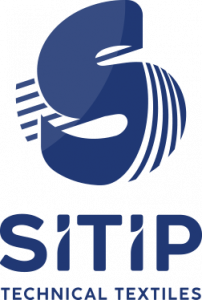La nostra produzione sostenibile
Sustainable and recycled fabric manufacturers

In recent years, there has been a growing necessity for companies to transform into sustainable textile companies. Production processes are increasingly becoming eco-friendly, focusing on environmental conservation and the optimization of consumption.
For this reason, companies manufacturing eco-friendly fabrics from recycled materials are striving to change and implement green industrial processes. This shift has the potential to transform the face of the industry and the entire approach of the textile sector to production.
On this page, we will discuss:
Sitip is an eco-friendly fabric manufacturer
There is a rising number of companies involved in the manufacture of eco-friendly fabrics witnessing a significant revolution. These companies are emerging as forerunners of change, not only offering sustainable textiles, but also high-performing products aligned with consumers’ needs and seasonal trends.
As a result, Sitip rethinks its sustainable fabric manufacturing process and applies a responsible business model that creates value for customers as well as eco-friendly textile suppliers. Only combining a strong social and sustainable awareness with advanced technologies and with the concepts of a modern circular economy can tangible economic, social, and environmental benefits be achieved.
Sitip is embracing the future by investing in environmentally friendly plants and solutions that are compliant with the United Nations’ sustainable development goals and with the following Certifications : ISO 9001 – ISO 9001 – ISO 50001 – ISO 14064 – SA 8000.
Hence, Sitip has developed the NATIVE Sustainable Textiles, fabrics made from recycled yarns and low-environmental impact chemicals. The goal is to manufacture eco-friendly fabrics that comply with stringent European and International sustainability regulations, with safety guaranteed by OEKO-TEX® Standard 100, BLUESIGN®, ZDHC and GRS certifications.
Sitip is a leading recycled fabrics supplier
Textile supply is also becoming sustainable. The exponential growth in the demand for “greener” yarns leads to changes in fabric supply as well.
Sitip’s mission is to ensure an eco-friendly, responsible , safe , circular manufacturing that respects the environment and upholds social and ethical standards.
Once again, the goal is responsible production and growth, throughout the entire process and supply chain, significantly increasing safety and reducing negative impacts on the environment , using non hazardous chemicals and preferring recyclable, recycled and bio-based fabrics for textile clothing manufacturing.
By opting for our extensive range of yarns, Sitip commits to providing:
- Quality: the selected materials are certified and highly sustainable. Sitip produces eco-friendly, resistant, and long-lasting fabrics.
- Sustainability: Sitip is actively engaged towards optimizing the production cycle to reduce waste, water and lower CO2 emissions. The goal is to achieve a sustainable balance through interacting and cooperative dialogue with all players in the textile industry.
- Adaptability: the sustainable fabrics manufactured by Sitip are safe, high-performing, versatile, and durable. This makes them suitable for various applications, both for industrial end-uses and clothing.
- Innovation: Sitip continuously invests in innovations to ensure performance, safety, high-quality standards. The Group is committed to deliver products, services, processes, and systems increasingly focused on achieving excellence and the full satisfaction of the final customer’s needs.
How does recycled fabric manufacturing work?
Innovation, commitment, and passion: these are the values that have guided us in adopting a recycling-focused production cycle centered on environmental respect.
Moreover, Sitip boasts the UNI EN ISO 14001 certification, ensuring the company’s compliance with internationally set standards for responsible environmental management. This shows the Group’s dedication to circular economy, reducing CO2 emissions and fostering a positive environmental interaction.
Sitip has also attained BLUESIGN®, OEKO-TEX®, ZDHC, and GRS certifications, underlining its commitment to safe, eco-friendly process management and the constant pursuit of high-quality standards to ensure complete customer satisfaction.
Additionally, the company has adopted the ISO 50001 certification and the ISO 14064 Carbon Footprint of Organization certification process, to measure its ecological footprint.
Only by this approach has the Group succeeded in developing an efficient production supply chain, consisting of various steps:
- Collection and selection of raw materials: Sitip carefully selects yarns and chemical dyestuffs and auxiliaries for producing safe and high-quality industrial, sportswear and fashion-tech fabrics , aiming to reduce virgin raw material usage in favor of recyclable, recycled and bio yarns.
- Spinning: Type 6 – Polyamide polymers are processed and spun into yarns.
- Warp and Circular Knitting: the produced yarns are used to create innovative, safe, high-quality, durable fabrics.
- Finishing: the loom-state fabric is prepared for subsequent finishing treatments, including processes like:
- washing to remove residual spin oil
- dyeing, to color the fabric
- after dying , an innovative washing process is implemented to preserve the fastness of the color. The fabric is dried with specific equipment.
- in the finishing process stage known as stentering, the fabric is heat-set and stabilized.
- During napping, the surface is brushed to make it softer and warmer.
- Finally, in the inspection phase, the finished product is fully inspected to ensure it meets required quality standards.
- Impregnation and Coating: involves applying a thin resin layer or agent onto the fabric to enhance its performance in terms of strength and compactness, water repellency and water-proofness.
- Flame lamination: a technical process aimed at bonding two or more layers of fabric or different materials. This method uses heat to meld the materials together, combining each component’s unique properties.
How does recycled fabric manufacturing work?
Sitip stands out as a leader among eco-friendly textile manufacturers. Consequently, the approach adopted in the production of fabrics aims at using sustainable materials such as recyclable and recycled synthetic fabrics both Polyamide and Polyester based.
This shows the dedication of Sitip as a sustainable textile company as well as underlying the use of the innovative NATIVE Sustainable Textiles technology which is essential in the creation of a wide range of “Made in Italy” fabrics with low-environmental impact chemicals.
Sitip has also attained BLUESIGN®, OEKO-TEX®, ZDHC, and GRS certifications, underlining its commitment to safe, eco-friendly process management and the constant pursuit of high-quality standards to ensure complete customer satisfaction.
As a recycled polyester manufacturer and supplier, Sitip is committed to deliver a quality fabric to ensure the sustainability and resistance of this material.
In fact, recycled polyester is versatile and can be used in many different contexts. Another aspect to take into account is that it is resistant to stains and, for this reason, it requires fewer washes.
Sitip, aligning with the UN sustainable development goals, guarantees a perfect conservation of the fabric and always monitors that they respect stringent ethical standards.
Sitip as a recycled nylon fabric manufacturer
Another core product for the sustainable textile company Sitip is the recycled nylon fabric. To create high-quality recycled nylon textiles, Sitip integrates cutting-edge techniques and environmentally responsible practices.
Recycled nylon is a synthetic material that is quite difficult to dispose of. One of its features consists of being extremely lightweight while maintaining its natural resistance to stains and tear.
Another aspect textile companies usually assess is the breathability of a material, a relevant aspect when it comes to technical clothing or sportswear. Recycled nylon is perfect as it ensures the maximum comfort in every context.
Lastly, Sitip as a recycled nylon manufacturer carefully monitors:
- the quality of the fabric produced
- the sustainability of the production cycle
- the high-performance of the fabrics.
